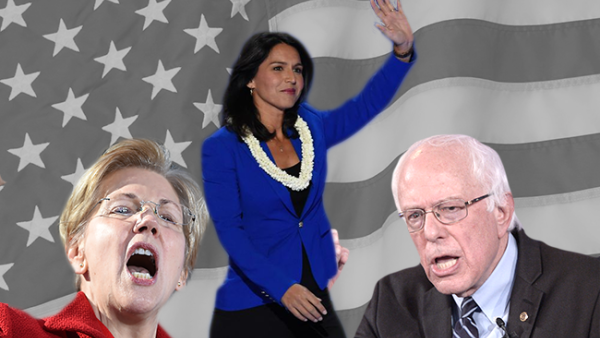By Ty Joplin
Hawaii Democrat Tulsi Gabbard’s announcement that she was running for president in 2020 began a heated debate regarding her views on foreign policy.
Though she markets herself to be against foreign wars aimed to topple other governments, some claim she is merely disguising a deference for foreign dictators. Her secret meeting with Syrian president Bashar al-Assad in particular was a red flag to those who fear an American President who is all too cozy with authoritarians.
The Gabbard debate on foreign policy between those on the left is still happening, and likely will continue for the next two years.
That’s because the underlying questions in the controversy, around which Gabbard is centered, aren’t really about Gabbard at all, but about what a Leftist-run American Empire actually looks like.
The American Empire is founded upon global dominance and military might: it therefore stands against the foundational values informing leftist candidates like human rights and equality. But presidents hold almost exclusive power in determining its direction and shape. If Gabbard, Bernie Sanders or Elizabeth Warren are to be president, they will take the reins of American Empire, and with them, be forced to answer questions both abstract and practical as to the Empire’s direction, size and priorities.
To help understand how all three leading left or progressive candidates stand on the maintenance, expansion, or retrenchment of American Empire, Al Bawaba has analyzed their speeches and interactions with foreign leaders to compile a prospective look at their foreign policy doctrines.
Gabbard’s foreign policy, from her words and actions, looks surprisingly militaristic despite her anti-war rhetoric, and stands to dangerously empower authoritarian leaders she views as strategic allies in vaguely defined wars against “radical Islam,” like Egypt’s Al-Sisi or India’s Modi.
Sanders’ foreign policy platform favors diplomatic engagement over the military incursions and includes an outright reduction in the reach of U.S. Empire mixed with a greater investment in joining and enforcing international conventions to preserve human rights and combat climate change.
Warren’s platform emphasizes the benevolent potential of an American Empire with a strong priority on countering rising Chinese influence. In so doing, she mythologizes American Empire in the mid 20th century, despite its myriad coups and the endless war in Vietnam that took place.
In a basic sense, Gabbard is merely the first candidates to have taken sides on some of these questions, but others will have to soon enough, and with those positions comes the paradox of a Leftist with an empire to administer.
The Gabbard Controversy, Explained
Washington Post headline (Washington Post)
Tulsi Gabbard is a Democrat Congresswoman representing Hawaii. Her domestic politics look similar to that of U.S. Senator Bernie Sanders: they both advocate for free and universal access to health care, abortion rights and a restoration of the Glass-Steagall Act to regulate Wall Street and the finance sector among other progressive causes. She also backs the emergent Green New Deal.
When she sensed that the Democratic Party was trying to find ways to push Bernie Sanders aside in favor of Hillary Clinton during the 2016 presidential race, she called them out for it and was ostracized by party leaders.
Where she begins to diverge from the Leftist canon is her foreign policy views.
She sells herself as an anti-war candidate but advocates for war against “radical Islam.” She has deep financial and political ties to Hindu nationalists who are linked to violent groups in India and who back India’s authoritarian-leaning President, Narendra Modi. She has met with and praised Egypt’s ruler Abdel Fattah al-Sisi who came to power in a coup and has sought to silence dissent in Egypt.
Most controversially, she held a meeting with Syria’s rule Bashar al-Assad, who started a civil war in his country by violently repressing peaceful protests in 2011. His regime is responsible for the vast majority of deaths that have occured during the Syrian Civil War, killing at least 200,000 civilians.
Jacobin headline (Jacobin)
Critics found her meeting with Assad a sign that she supported his government. The Washington Post called Gabbard “Assad’s Mouthpiece.” Vox stated that “the Congress member made a name for herself as the leading congressional apologist for Syrian dictator Bashar al-Assad.” It did not help that she kept the meeting secret, opting to not inform party leadership.
Mehdi Hasan, a journalist with Al Jazeera and The Intercept, blasted Gabbard on Twitter with a long thread that called out her “downplaying” of “Assad’s crimes.”
Defenders of Gabbard like Young Turks reporter Michael Tracey were quick to point out that she has called Assad a “brutal dictator’ and merely stands against wars aimed at toppling foreign regimes.
Gabbard herself called the meeting an “unexpected” fact-finding mission: “I felt it’s important that if we profess to truly care about the Syrian people, about their suffering, then we’ve got to be able to meet with anyone that we need to if there is a possibility that we could achieve peace. And that’s exactly what we talked about,” she told CNN’s Jake Tapper.
On Reducing the Size of the American Empire
American Empire (Wikimedia)
The dilemma of whether or not to meet with a dictator is one that will continuously arise for a U.S. President. Most politicians and analysts agree that meetings can be good if they are approached in way that encourages support for human rights and does not kowtow to the dictator in question.
However, in order to meet with a foreign dictator with any amount of sway over him or her, that U.S. president needs to have some kind of leverage in order to effectively pursue their agendas.
Many politicians, Gabbard herself included, advocate for a kind of retrenchment of the U.S. Empire: a reduction in its size and holdings internationally.
To preside over a empire’s retrenchment carries unique opportunities to become a more ethical, humane and cost-efficient nation, but also problems that may complicate that same empire’s ability to lead the international community’s efforts to promote peace and greater respect for human rights or pressure a leader, like Assad, to stop killing his own people.
Retrenchment is often falsely framed as dangerous by imperialists and neoconservatives in the U.S. as a way to justify increase military presence abroad and more vaguely defined, indefinite wars. This does not always have to be the case.
Previous empires like Britain and France have successfully retrenched without existentially endangering their own people. They did, however, leave terrible legacies and political vacuums that are still destabilizing much of the world.
So let’s do a run-down of where the major Left-leaning candidates, specifically Gabbard, Sanders, and Elizabeth Warren, stand when it comes to downsizing the Empire while retaining its diplomatic sway.
The Gabbard Doctrine
Tulsi Gabbard (AFP/FILE)
Tulsi Gabbard’s focus for her candidacy is foreign policy; “the main reason I'm running has to do with an issue that is central to the rest—war and peace,” she said in her announcement. But her actual positions on war and peace are difficult to place.
She is against wars that are aimed at toppling foreign governments but has stated that, “when it comes to the war against terrorists, I’m a hawk.” She’s also enjoyed the support of alt-right figures like Steve Bannon and former KKK Grand Wizard David Duke for arguing that the U.S. needs to more aggressively fight against “Radical Islam.”
This rhetoric mirrors that of some neoconservatives who justified wars like Iraq and Afghanistan: the same kinds of wars Gabbard has denounced as useless and overly costly. One important difference she has with standards war hawks is her support of drones and special teams over mass amounts of boots on the ground: “there is a place for the use of this technology, as well as smaller, quick-strike special force teams versus tens, if not hundreds of thousands of soldiers occupying space within a country,” she said in an interview with Truthout.
Her troubling relationship with India’s Modi and Egypt’s Sisi also reveal a strange dynamic of her foreign policy: she appears to not simply be anti-regime change but proactively for regimes that also believe “radical Islam” is the problem.
Al-Sisi seized power in a military coup, which overthrew the democratically elected Muslim Brotherhood government. Since then, he has rounded up Muslim Brotherhood politicians and activists, jailing and sentencing many of them to death, and quashed dissent to his rule. He is an authoritarian.
But after her meeting with al-Sisi, Gabbard praised him: “President el-Sisi has shown great courage and leadership in taking on this extreme Islamist ideology, while also fighting against ISIS militarily to keep them from gaining a foothold in Egypt. The U.S. must take action to recognize President el-Sisi and his leadership.”
Gabbard with Egypt’s President Al-Sisi (middle-right) (AFP/FILE)
India’s Prime Minister, Narendra Modi, was investigating for complicity in a massacre of Muslims in 2002. Modi himself leads India as a proto-authoritarian Hindu nationalist that has politically marginalized India’s 172 million Muslims.
Put simply, if they want the kind of wars she does, she appears to have no problem endorsing them even if they maintain despicable human rights records.
She does not reserve the same deference for Saudi Arabia. Gabbard has voted to end the war in Yemen and continuously criticizes the U.S.’ alliance with Saudi.
To put all this in terms of retrenchment and empire: Gabbard appears to stand for a reduction in the scope of U.S. hard power, or military might, except in cases that relate to Islamist extremist violence or even potentially Islamism.
Practically speaking, her doctrine looks like a continuation of Obama-era entanglements justified by Trump-era ‘War on Terror’ rhetoric.
She has voted once to increase the budget of the U.S. Military, which casts doubt on her dedication to reducing its size.
In her diplomatic efforts, she appears to be willing to sacrifice whatever influence the U.S. has diplomatically to pressure other nations for greater human rights respect. There are no records of her confronting Assad, Sisi or Modi about their systemic violations of human rights or brutal means of securing their power.
The Sanders Doctrine
Bernie Sanders (AFP/FILE)
Bernie Sanders appears to have the clearest message when it comes to the U.S. Empire: it must be reduced and its military might replaced by a strong emphasis on strengthening the international community’s respect for human rights and efforts to combat climate change.
"The goal is not for the United States to dominate the world," Sanders said in a 2017 speech. "Nor, on the other hand, is our goal to withdraw from the international community and shirk our responsibilities under the banner of 'America First.' Our goal should be global engagement based on partnership, rather than dominance. This is better for our security, better for global stability and better for facilitating the international cooperation necessary to meet shared challenges."
Later, in a 2018 speech entitled “Building A Global Democratic Movement to Counter Authoritarianism,” Sanders advocates for more critical engagements with Israel and Saudi Arabia, who are both guilty of conducting war crimes and marginalizing groups both in and out of their own country. He also emphasizes the threat of climate change—an issue that is rarely brought up by Warren or Gabbard in discussions of their own foreign policy.
Sanders makes sure to admit that the post-WWII global order, of which the U.S. has led, has empowered some dictators: “We must look honestly at how that order has failed to deliver on many of its promises, and how authoritarians have adeptly exploited those failures in order to build support for their agenda.” On authoritarians themselves, Sanders says “Interestingly, many of these leaders are also deeply connected to a network of multi-billionaire oligarchs who see the world as their economic plaything.”
He almost never votes in favor of increased military spending, and in instances where he has voted to authorize spending in wars, those bills are often earmarked with crucial domestic expenditures. For example, the June 2008 spending bill that authorized funds for the Iraq and Afghanistan Wars was voted on during the height of the recession, and included an unemployment benefits extension in it.
Many of his foreign policy proposals relate to forming a fairer, more equitable and humane United States that provides free healthcare, a living wage and other protections to workers. Dozens of countries in international bodies like U.N. vote in a bloc with the U.S.: it can be reasoned then, that if the U.S. begins voting for a less militaristic world under Sanders and one that protects human rights better, other nations will vote to do the same, and some broad momentum can be created.
American troops in Kurdish-held Manbij, Syria (AFP/FILE)
It is also crucial to note that Sanders rarely mentions adversaries that can be confronted militarily. He talks about climate change while Gabbard warns against ISIS. He frames income inequality as a foreign security problem while Warren makes mention of the same problem yet emphasizes China as a tangible threat.
How to sustain that momentum while reducing the size of the empire however, is a question that is of critical importance to the success of a Sanders presidency.
He would likely seek to re-enter the Iran nuclear deal and the Paris Agreement, ratify the Kyoto Protocol and ratify the United Nations Convention on the Rights of the Child among other conventions.
But these conventions and others that form the basis of customary international law and norms are never self-enforcing. They require an external force to apply the pressure necessary for states, including authoritarian ones, to comply. Where will Sanders find this leverage?
Whether Sanders has a plan to do that without hard power or pushing them into the arms of a counter-bloc of countries like China and Russia, who are both skeptical of international conventions and human rights laws, remains to be seen.
From all this, a potential Sanders Doctrine would redirect military funding towards ways to bolster the U.S.’ diplomatic strength, or soft power.
His empire would likely look smaller and more focused on treaties and diplomacy. If the 20th century U.S. was continuously run by Sanders-like figures, it may look more like a Germany or a France than a country with dozens of military bases around the world.
The Warren Doctrine
Elizabeth Warren (AFP/FILE)
Elizabeth Warren’s vision of empire seems to stand somewhere in between Sanders and former president Barack Obama.
She is skeptical of more wars and military engagements and seeks an end for U.S. support of the war in Yemen, a war Obama helped Saudi start in 2015, but also emphasizes confronting China more forcefully than either Sanders or Gabbard. Obama too at the end of his presidency was beginning to shift his foreign policy outlook from the Middle East to the South China Sea to pivot against China.
In stark contrast to Sanders’ willingness to forgo America’s Empire, Warren appears to want to preserve its historic shine.
“There’s a story we tell as Americans, about how we built an international order—one based on democracy, human rights, and improving economic standards of living for everyone,” Warren said in Boston in 2018. “It wasn’t perfect—we weren’t perfect—but our foreign policy benefited a lot of people around the world.”
She then claims American Empire changed in the 1980s under Reagan as it became engulfed in endless wars in the Middle East in service mostly to corporation too big to fail.
“We must refocus our security policies by reining in unsustainable and ill-advised military commitments and adapt our strategies overseas for the new challenges we’ll face in this coming century,” she continues. And we need to end the fiction that our domestic and foreign policies are somehow separate, and recognize that policies that undermine working families in this country, also erode America’s strength in the world.”
As Peter Beinart points out for The Atlantic, Warren’s timeline is strange in that it ignores the war in Vietnam. It also ignores the various CIA-backed coups in Central and Latin America that the continent is still reeling from.
To put it explicitly in terms of an Empire’s expansion or reduction, Warren believes in the potential for a benevolent American Empire if it can wean itself off corporatism, inequality, and neoconservative foreign policies. In harkening to the mid 20th century as a high point for U.S. Empire, she hints that she will aim for a more traditionally conservative empire
She also recommends being “vigilant about the threat of terrorism, whether from Afghanistan or anywhere else. But rather than fighting in an Afghan civil war, let’s help them reach a realistic peace settlement that halts the violence and protects our security.”
To help her achieve a shift to focusing on peace and stability, she calls to form and strengthen alliances on shared principles “like our shared commitment to human rights, but they are also about safety in numbers. Not even the strongest nation should have to solve everything on its own.”
In contrast to Sanders, Warren sees international alliances as means to safeguard U.S. influence, whereas he sees them as ways to dissolve the U.S.’ exceptional, hegemonic position into a broad-based international coalition. In another contrast to Sanders, Warren has voted to increase the U.S. military budget during Trump’s tenure.
The Small, Nagging Questions of Empire
The Course of Empire Destruction 1836 by Cole Thomas (Wikipedia)
All three progressive candidates market themselves as broadly anti-war, but whose administration will reduce the size of the U.S.’ military reach and power?
Gabbard seeks to hone it against the impossible vague enemy of ‘radical Islam,’ while Warren seeks to rehabilitate it. Only Sanders openly advocates for its retrenchment.
Honing, rehabilitating and retrenching all require massive military shifts and restructuring. To achieve these tasks, which bases will they shut down or downsize? From which countries will they pull out troops? How will they do it in a responsible way that avoids the opening of political vacuums, like what is currently happening now with Trump’s withdrawal from Syria?
For Sanders, how will he retrench without losing the diplomatic leverage necessary to enforce international human rights norms and promote the sustainable development off of which he has built his foreign policy platform?
For all their respective pullouts, are they okay with potentially losing influence over a country like Iraq or Sudan to a Turkey or Iran? Do they perceive that as a security threat to the U.S. or a necessary part of reducing a costly, bloated and ineffectual empire?
How will they prevent the kinds of vacuums and suffering that opened up in Africa and the Middle East in the wakes of Britain and France’s colonial retrenchment and subsequent political meddling?
Warren has a tentative plan to counter China’s rising economic influence: but do Sanders and Gabbard? Do they want to have one?
Having a thoroughly moral domestic policy for the Left means standing for needs of the working class, free healthcare and education, investing in public projects and protecting human rights too. But translating this into foreign policy gets tricky. For trades and deals with dictatorial regimes like the one in Syria, will they attach humanitarian conditions to deals or boycott the country entirely until they protect their people’s rights?
How can they ensure their conditions or disengagement doesn’t push the country closer into the orbit of aspiring global players who are openly authoritarian like Turkey, Russia or China, who do not attach such conditions?
It is probably unwise to pretend to have definite answers to these questions now, but they will become more important as the 2020 presidential election draws nearer: Americans will not just be voting for who has the most responsible domestic policy in their eyes, but what kind of Empire they want.
Some candidates, like Warren and Gabbard, think an empire can do good if it is refocused, though Gabbard seems fine with sacrificing its diplomatic powers.
Sanders on the other hand, thinks the world may be better off without it.







